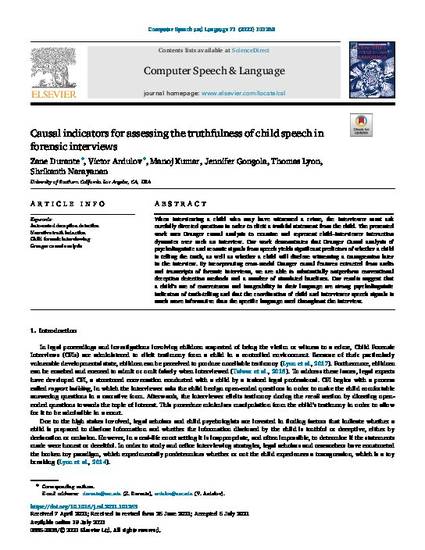
Article
89. Causal indicators for assessing the truthfulness of child speech in forensic interviews.
Computer Speech & Language
(2021)
Abstract
When interviewing a child who may have witnessed a crime, the interviewer must ask carefully directed questions in order to elicit a truthful statement from the child. The presented work uses Granger causal analysis to examine and represent child-interviewer interaction dynamics over such an interview. Our work demonstrates that Granger Causal analysis of psycholinguistic and acoustic signals from speech yields significant predictors of whether a child is telling the truth, as well as whether a child will disclose witnessing a transgression later in the interview. By incorporating cross-modal Granger causal features extracted from audio and transcripts of forensic interviews, we are able to substantially outperform conventional deception detection methods and a number of simulated baselines. Our results suggest that a child's use of concreteness and imageability in their language are strong psycholinguistic indicators of truth-telling and that the coordination of child and interviewer speech signals is much more informative than the specific language used throughout the interview.
Keywords
- casual indicators,
- child speech,
- child abuse,
- child sexual abuse,
- child witness,
- child neglect,
- child forensic interviewing,
- automated deception detection,
- narrative truth induction,
- Granger casual analysis
Disciplines
Publication Date
Summer July 18, 2021
Citation Information
Durante, Z., Ardulov, A., Kumar, M., Gongola, J., Lyon, T.D., & Narayanan, S. (2022). Causal indicators for assessing the truthfulness of child speech in forensic interviews. Computer Speech & Language, 71, 101263.
